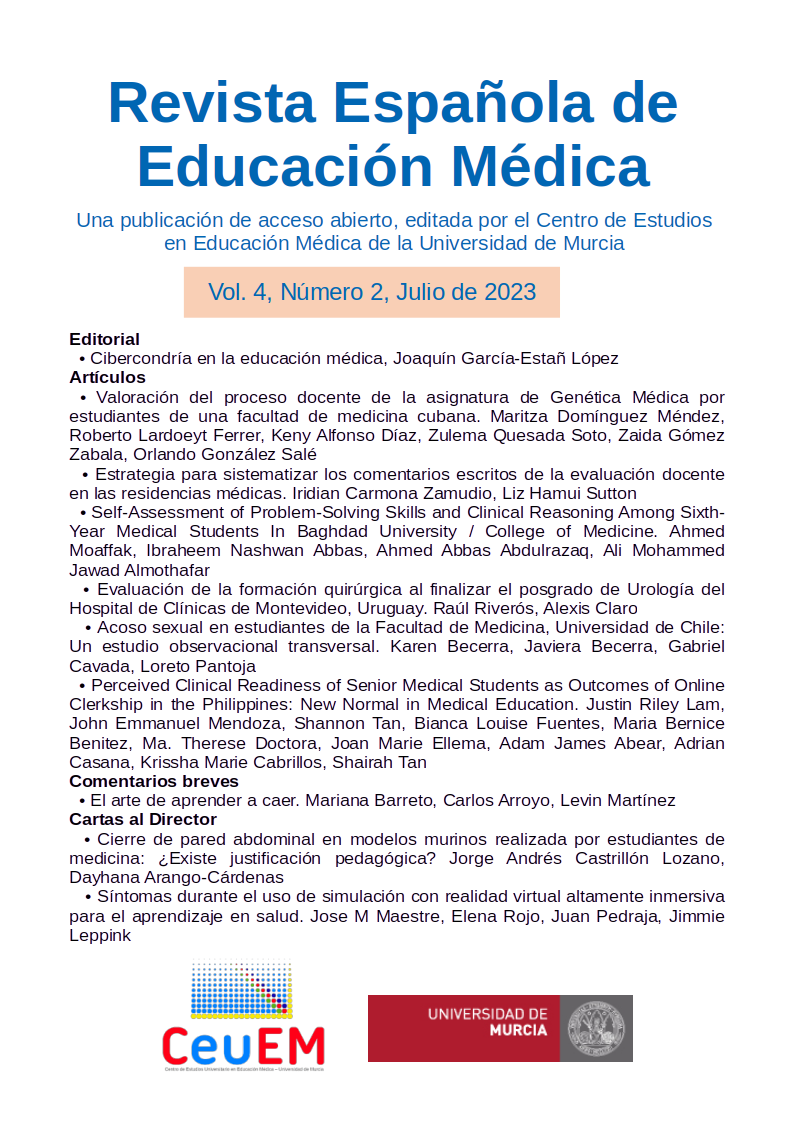Sexual harassment in students of the Faculty of Medicine, University of Chile: A cross- sectional observational study.
Abstract
Sexual harassment within an academic context is a type of sexual violence. It has been approached by the University of Chile by implementing a protocol of action for sexual harassment, workplace harassment, and arbitrary discrimination. Its objective is to eradicate sexual harassment and reduce gender-based violence in the University of Chile through a program designed to prevent these issues and attend to the people affected by these. Objective: To determine the prevalence of sexual harassment at some point in their university among students from the faculty of Medicine of the University of Chile, and describe their knowledge and use of the current protocol present in the institution. Methods: A cross –sectional prevalence study implemented between 2021 and 2022, consisted of a total of 550 students selected through a convenience sampling by programs. The questionnaire considered 3 items: personal characterization, prevalence of harassment, and the faculty’s protocol of action. The data was collected through an online survey. Results: The prevalence of sexual harassment among students of the faculty of Medicine of the University of Chile corresponds to a total of 13,64%, with a majority of women being harassed by male students. Although 43,09% of the subjects reported knowing the current protocol of action, only 1,09% declared having vast knowledge about it. Conclusion: The results obtained in this study show the importance of effectively approaching these issues, since they could lead to a negative impact on people’s academic life and their subsequent working environment.
Downloads
-
Abstract1707
-
pdf (Español (España))1083
-
pdf1083
-
Anexos (Español (España))47
References
Gasman N, Villa Torres L, Moreno C, Billings DL. Comprender y abordar la violencia contra las mujeres. Violencia sexual. Inf Nac sobre Violencia y Salud [Internet]. 2016;167–204. http://www.paho.org/hq/index.php?option=com_docman&task=doc_download&gid=23947&Itemid=270
Ministerio de Salud de Chile., Servicio Médico Legal., Fiscalía., UNICEF. Atención de víctimas de violencia sexual 2016. 2016. 131 p.
Observatorio contra el acoso sexual (OCAC). Radiografía Del Acoso Sexual En Chile. 2020;1–72. Available from: https://www.ocac.cl/wp-content/uploads/2020/07/Informe-encuesta-OCAC-2020.-Radiografía-del-acoso-sexual-en-Chile.pdf
Castaño-Castrillón C, Jaime J, Katherine E, Andrea J, Stiven J, Manuel J, et al. Acoso sexual en la comunidad estudiantil de la Universidad de Manizales (Colombia). Rev Colomb Obstet Ginecol [Internet]. 2010;61(1):18–27. Available from: http://www.redalyc.org/articulo.oa?id=195215352003
Díaz J. Implementación de protocolos de acoso sexual en universidades chilenas: Lecciones de la experiencia en los Estados Unidos de América. Facultad de derecho. Universidad de Chile. 2019. p. 1–55.
Biblioteca del congreso nacional de Chile. Ley 21.369: Regula el acoso sexual, la violencia y la discrimaciòn de género en el ámbito de la educación superior [Internet]. 2021. 2021. Available from: https://www.bcn.cl/leychile/navegar?idNorma=1165023
Canales I, Gálvez R. Acoso sexual: la nueva ley que obliga a las universidades a erradicar este delito. 2021.
Universidad de Chile., Dirección de Igualdad de Género. Protocolo De Actuación Ante denuncias sobre acoso sexual, violencia de género, acoso laboral y discriminación arbitratia. 2019;51.
Nash C. Respuesta Institucional ante el acoso sexual en la Universidad de Chile. 2015;34. Available from: http://web.uchile.cl/archivos/VEXCOM/AcosoSexualU/files/assets/common/downloads/publication.pdf
Abadal E. Acoso en el campus. El acoso sexual en la universidad de Chile. 2019;9,56.
Universidad de Chile. Política para prevenir el acoso sexual en la universidad de Chile. EnAPG. 2017;12.
Observatorio contra el acoso en Chile. Primera Encuesta de Acoso Callejero en Chile Informe de resultados 2014. 2020;1–72.
Hernández R, Fernández C, Baptista P. Metodología de la investigación. Sexta edic. Mc Graw Hill Education, editor. 2014. 600 p.
Komaromy M, Bindman AB, Haber RJ, Sande MA. Sexual Harassment in Medical Training. N Engl J Med [Internet]. 1993 Feb 4;328(5):322–6. Available from: http://www.nejm.org/doi/abs/10.1056/NEJM199302043280507
Instituto Nacional de Mujeres. Machismo [Internet]. Glosario de la igualdad. 2015 [cited 2022 Nov 20]. Available from: https://campusgenero.inmujeres.gob.mx/glosario/terminos/machismo
Ruiz C, López J, Sánchez P. Violencia de género y abuso de alcohol en contextos recreativos. Univ Granada [Internet]. 2020;1–10. Available from: https://digibug.ugr.es/bitstream/handle/10481/62771/-carmenruiz-etal.pdf?sequence=1&isAllowed=y
Pariente E. El uso de alcohol y drogas no eximen al agresor de responsabilidad. La tercera [Internet]. Santiago; 2021 Jan 4; Available from: https://www.latercera.com/paula/el-uso-de-alcohol-y-drogas-no-eximen-al-agresor-de-responsabilidad/
López T. Acoso por medio de las tecnologías en las redes sociales durante tiempos de pandemia en Ecuador, una revisión sistemática [Internet]. Ecuador; 2021. Available from: https://dspace.ups.edu.ec/bitstream/123456789/20242/1/UPS-GT003203.pdf
Evangelista García AA. Normalización de la violencia de género cómo obstáculo metodológico para su comprensión. Nómadas [Internet]. 2019 Dec;(51):85–97. Available from: http://nomadas.ucentral.edu.co/index.php/component/content/article/2563-violencias-de-genero-en-las-universidades-nomadas-51/2-reflexiones-y-retos-pedagogicos-y-metodologicos/1035-normalizacion-de-la-violencia-de-genero-como-obstaculo-metodologico-para-su
Martínez Ochoa H, Salazar Gutiérrez S. Experiencia de acoso sexual en estudiantes universitarios y la espacialidad intersticial como dispositivo de exclusión-negación1. Ultim década [Internet]. 2022 May;30(58):257–88. Available from: http://www.scielo.cl/scielo.php?script=sci_arttext&pid=S0718-22362022000100257&lng=en&nrm=iso&tlng=en
Ministerio de Educación. Protocolos contra el acoso sexual en educación superior. Sugerencias para su elaboración. 2018;1–40. Available from: https://www.mineduc.cl/wp-content/uploads/sites/19/2018/05/acoso-sexual-educacion-superior.pdf
Wang X, Cheng Z. Cross-Sectional Studies: Strengths, Weaknesses, and Recommendations. Chest. 2020 Jul;158(1S):S65-S71. doi: 10.1016/j.chest.2020.03.012. PMID: 32658654.
Copyright (c) 2023 Servicio de Publicaciones de la Universidad de Murcia

This work is licensed under a Creative Commons Attribution-NonCommercial-NoDerivatives 4.0 International License.
The works published in this magazine are subject to the following terms:
1. The Publications Service of the University of Murcia (the publisher) preserves the economic rights (copyright) of the published works and favors and allows them to be reused under the use license indicated in point 2.
2. The works are published under a Creative Commons Attribution-NonCommercial-NoDerivative 4.0 license.
3. Self-archiving conditions. Authors are allowed and encouraged to disseminate electronically the pre-print versions (version before being evaluated and sent to the journal) and / or post-print (version evaluated and accepted for publication) of their works before publication , since it favors its circulation and earlier diffusion and with it a possible increase in its citation and reach among the academic community.



















